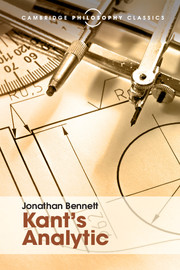Preface to this edition
Published online by Cambridge University Press: 05 July 2016
Summary
Bennett's Kant's Analytic is one of the two great Kant books of the 1960s, the other being Strawson's The Bounds of Sense. These books cast new light on Kant's doctrines and arguments in the Critique of Pure Reason and set several generations of philosophers to grappling with Kant.
Not everyone agreed with Bennett's approach to Kant, which he continued to pursue in subsequent works on the early modern philosophers. He said in the 1966 preface that he was going to fight Kant tooth and nail, and so he did. He treated Kant as someone to tilt with in the journals, demanding clarification on some points, offering clarification on others (perhaps using contemporary diction or distinctions), setting forth his arguments more explicitly than the master himself had, and subjecting the results to dispassionate evaluation. It was philosophy of a high order, so good that some of his critics refused to accept it as history of philosophy, apparently believing that no one could do both things at once.
There can be no going back on some of the distinctions and expository memes Bennett introduced. There is the observation that while for Locke and Hume, to have a concept is to harbour an introspectable mental item, for Kant it is to have the ability to recognize certain things, draw certain inferences, and answer certain questions. There is the capsule description of the Transcendental Deduction as showing that we cannot have experience without employing concepts and the Metaphysical Deduction as showing that to use any concepts we must use Kant's favoured dozen. There is the distinction between the genetic (bad) and the analytic (good) forms in which a thesis may be propounded. What Hume offered as an account of the causal conditions that make us believe in the existence of bodies is better seen as an analysis of what it means for bodies to exist; what Kant offered as a transcendental psychological theory of the operations that produce unity of consciousness is more profitably construed as an account of the criteria representations must satisfy to belong to a single self.
The most exciting parts of Bennett's book are those in which he analyses the notion of objectivity and advances Kant-inspired arguments for the existence of an objective realm.
- Type
- Chapter
- Information
- Kant's Analytic , pp. ix - xPublisher: Cambridge University PressPrint publication year: 2016



